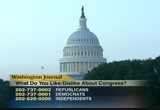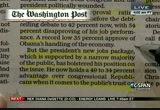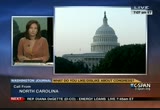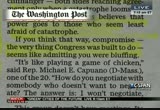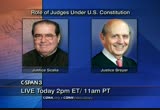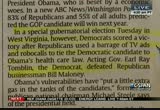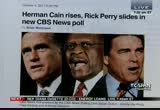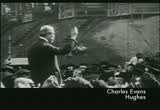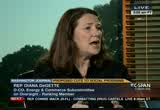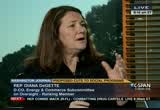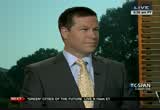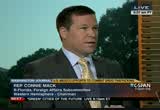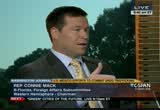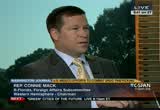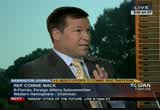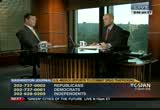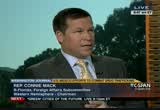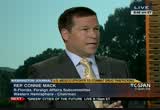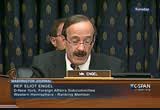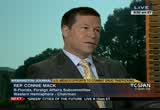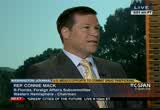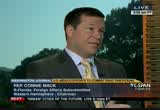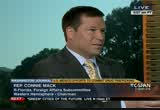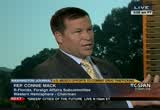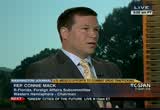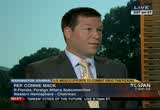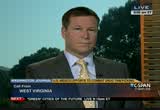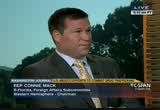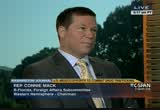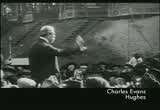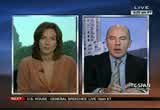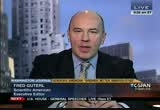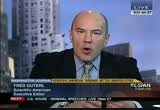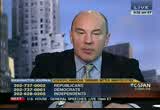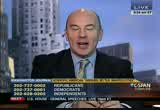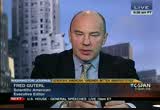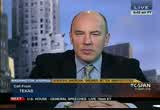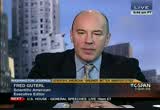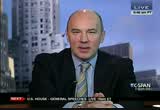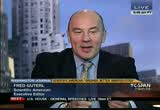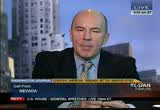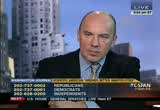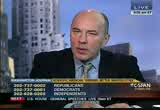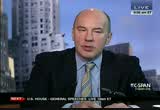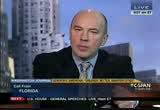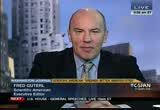tv Washington Journal CSPAN October 5, 2011 7:00am-10:00am EDT
7:00 am
is the chairman of the foreign affairs subcommittee on the western hemisphere. at 8:30 a.m., he will take your question about the ability of the mexican government to combat organized crime. and for our weekly spotlight on magazines, we will be joined by fred guterl, executive editor of "scientific american." "washington journal" is next. ♪ host: a new poll finds out congressional approval rating at its lowest in decades. good morning, everyone, on this wednesday, october 5. what do you like or dislike about congress?
7:01 am
give us a call, send us an e- mail or tweet, or post on our facebook page. 14% of the public approves of the job that congress is doing according to the latest poll, lower than the other elections when the majority partner -- party is on the verge of losing power in the house. they asked several questions about the approval rating of congress, with little hope of what that deficit reduction committee could do. when they passed how likely that
7:02 am
republicans and democrats will agree on a deficit reduction plan, 20% say it is likely, a 24% say that it is unlikely. -- 74% say that it is unlikely. they also ask if they could not agree, that is, the super committee, do you support or oppose major cuts from military and domestic programs? 57% oppose that idea, 36% supported. on president john -- on president obama's approval rating, it slipped from 47% before the debt ceiling debate, to 42% now with 54% disapproving, a record low 35% approve of his handling of the
7:03 am
economy. this is a change from september when they were evenly split at 42% each. some republicans say that the comparison between their leaders and the president would not matter once the gop has a presidential nominee. what do you like or dislike about congress? let's listen to john first. caller: the biggest problem that we have is that both sides, conservatives and progressives, socialist, do not feel as though their representatives are listening to them. you have the far left which feels that obama and company had total control and they did not
7:04 am
adhere to the european socialist model that mr. obama was trying to attempt. and the people on the right see that in the last election, we basically had the maturation of the installation of the progress of law through universities, whether it becomes indoctrination or whatever. everyone feels as though the last election left us on our head. what used to be the norm was now of the antithesis. a lot of americans feel that, wait a minute, we're getting away from our founding, from the individual sovereignty to the government controlled model. the citizens and voters are really the boss. so when you feel that your employee is not listening to what you have to say or getting the job done, then you have annexed. you're seeing both sides -- then you have angst.
7:05 am
host: what you mean they are not listening to you? there is a front-page article talking about democrats being inspired by the president's new tone. they like it. if he is appealing to the liberal base, as some are saying is doing now, then the democrats feel like, now he is listening to us. so what does that mean for compromise? caller: it will be tough for compromise. like you said, the left wants to ratchet it up. they're glad to say that obama is starting to ratchet it up. host: do you think the right ones that as well from their leaders? caller: the right wants their leaders to basically require mr. obama to produce these bills. i mean the perfect example is
7:06 am
the pass this bill. we have to see what is in that. for everyone's information that they do not already know, president obama wave to that nice recovery bill in front of everybody and a joint session three the next day after that, lou egol mayor -- louie gohmert filed a bill with the exact same name because president obama had not filed it. there was no bill. when you of a president that basically throws hypothetical out there and has no substance, and that is what i am hearing on the street, everyone is saying that i am telling my congressman and senator, you read this bill. i want this bill to be factual. i want this bill to be in paper and print. when you have this kind of hypothetical out there ginning
7:07 am
it up with no substance behind it, how was the public supposed to get behind congress or the president? host: let's hear from an independent. tom joins us from north carolina. caller: i am concerned about the fact that our congressmen think that we do not pay attention to the reality as shown by the responsible media. that is their generous -- that is their journalistic responsibility to a separate day. let me give you some examples. number one, from our congressmen, i will not mention his name because there is no reason to embarrass this gentleman. he is just a typical congressman. i wrote him concerning the libyan situation, which as you know, it is more less resolved
7:08 am
by now. they're just hunting down a gaddafi. my congressman wrote me a long full-page letter detailing the activities of congress concerning the libyan situation. which just amounted to a bunch of hot air, a party line put out by mr. boehner and his cohort, blah, blah, blah. a party line put out by the democrats and their party line, blah, blah, blah, none of which was relevant at all to the libyan situation. the libyan situation from the point of view of united states consisted of firing off half a billion dollars of a cruise missiles. host: i do not want to get too far down this road. it is your point that you had
7:09 am
expressed your opinion about this and they do not seem to be listening, similar to the last caller? caller: to give a sound bite, which is apparently what you want, i guess. host: from tom parsons, notice the direction of government in the same period. if you want to post your comments on our facebook page, go to facebook. sybil, in louisiana, what is the name of your town? caller: natchez, louisiana. what i like about congress is the fact that -- what i do not like about congresses that there is no fair and balanced compromise between the two parties. one party wants something done,
7:10 am
the other party opposes it and would like their particular entity to be done. it is becoming a big circus in washington, d.c., when we are the citizens or constituents that put and then there to make their unbalanced -- that put them there to make their unbalanced laws to make this country better than what it -- a pair and balanced loss to make this country better than what it is. we are in this position right now with the economy and no one is able to come up with a better decision. one wants one thing and the other wants another thing and no one is coming together. it is even difficult for mr. obama, president obama , if you will, to get some of his
7:11 am
legislation passed. congress and the senate cannot come together in a fair and balanced way. host: on that jobs legislation that president obama has been talking about on the campaign trail, pressing his republican colleagues in the congress and the democratic-controlled senate to take it as well, the poll says that he is struggling with the lowest approval rating on the economy, but republicans in congress have an even lower rating. here is the few wall street journal" this morning. the back-and-forth in the senate yesterday. they blamed congress for allowing the bill to languish. they demanded an immediate vote on the bill.
7:12 am
7:13 am
toy're not paying attention the plight of the elderly. i am a retired teacher and i have worked with the elderly, many who have parts of their route from, you can see the ground, and no one seems to me deal with their problems. they are too proud that ask for help and i have seen elderly women eating cat food because they are too proud ask for help. as a republican, i have been proud to stand on my own two feed. but what can they do more for the elderly? host: @ democrat from mississippi. caller: the republicans, what i'm saying about the republicans
7:14 am
is that they got into office [unintelligible] those that were elected in the last election, they came in on jobs. now they have turned it around and the people that elected them wanted to straighten up the fiscal situation. that was not what they got elected on. another thing i had to say. they had our governor, haley barbour, on the tv the other night talking about the economy. he is hurting the most poor people in the state of mississippi! host: 75% of the people have no idea going on and they're
7:15 am
7:16 am
judy, a republican in nashville, tenn., you are next. caller: i have a lot problems with congress. i did vote for obama in the last election. and probably will vote for him again, because he is a constitutional lawyer. this is a government for the people and by the people. but this congress does not give a damn about the people. i did not mean to use a curse word, but they do not consider anything. we have people without jobs, and now they're going to say they are worried about what they're going to give to pakistan? slap pakistan and the hand. give that money to the american people. that way they can start their own businesses, we will explode the economy, and have an army waiting for that trot.
7:17 am
take their money away condemn, give it to us. host: judy, we will leave it there. the house committee will work on bills to date they will implement free trade agreements with south korea, colombia, and panama. we will have live coverage of that hearing at 10:00 a.m. eastern this morning on c- span.org. also, are rare hearing on capitol hill with two supreme court justices. justice scalia and to breyer will testify about the role of the court -- the role of the justices and these two are the longest serving members of the current court. they are expected to be asked about our range of topics from personal life to cameras in the corporate we will cover this
7:18 am
hearing as well at truth 30 p.m. eastern time on c-span.org. crag in ontario, canada, what you think about our congress? caller: i was hoping to elevate the conversation a little. i realize that today is complain about congress today. host: we are asking people what they like or dislike. caller: ok, well if it is this light, we will have lots of complaints. but like, well, obviously, there are some middle-of-the-road people who work together and obviously, you know -- i read the national journal article that has a graph that showed who votes on the left and who votes from the right and who is in the middle. but unfortunately people that vote in the middle of the people
7:19 am
who who the party dislikes the most. with warner from the democrats and the various other people from the republicans that are more century, i think the tea party has purged many of them, but they are not in the most favored status category. so we're becoming more polarized as a country, and what do i like about the congress? i guess, a 11% from all the recent polls speaks for itself. host: chris christie is out. here is what the new jersey governor had to say yesterday when he held a news conference to announce that he will not run. >> of the last few weeks, i have thought long and hard about this decision. i have listened to so many
7:20 am
people and considered whether this was something i needed to take on. but in the and, what i always felt was the right decision remains the right decision today. now was not my time. i have a commitment meant to new jersey that i simply will not abandon. host: "usa today" says this. a special election in west virginia where democrats scored a victory after republicans used
7:21 am
a barrage of tv ads to tie the democratic candidate to obama's health care law. two critical test the loom. another debate in new hampshire in october 11, with an -- giving. another opportunity to show a stronger command of issues. that is the latest on 2012 politics. on that west virginia race, let me show you the front page of the "charleston gazette." a close call. a democratic call are in cleveland, ohio, good morning. -- a democratic caller in day --
7:22 am
in cleveland, ohio, good morning. caller: there are some congress people up there working very hard for the people, like van hollen and nancy pelosi. a few others. but i cannot find anyone like that on the republican side working for the 99%. it just seems like our congress has been blocked by the large corporations headed by d. koch brothers. we never voted for grover norquist, but they have more respect for him than they do for the 99% of the american people. they are completely detached. host: you sound like a longtime democrat. caller: i'd voted for reagan.
7:23 am
i am old, 58 years old, but i've voted for reagan. i believed in him. but they are looking for another reagan. he was a professional actor and he was able to deceive us with impunity. when he started that reaganomics, and we have been stuck on the toilet ever since. host: anything that you have been concerned about on the left? caller: what i am concerned about on the left, we have people with their own interest like landrieu and louisiana. she has to look out for those old barons because that is our territory. she would oppose the american jobs bill because they do not want i close the loopholes and stop corporate welfare. but they want to attack the social security people who are $14,000 of their median income of a social security recipient.
7:24 am
these people are just barely hanging on. host: in economic news, in le a lot of the papers about the federal reserve testimony yesterday -- in a lot of the papers about the federal reserve testimony yesterday, ben bernanke went to congress with a message, cut out the brinksmanship and do not do it so fast that it undermines economic growth. and in the "financial times," this picture of bernanke accusing china of hurting the recovery with currency moves. it is damaging prospects for global recovery with this deliver it intervention in the currency market to hold down the value of its currency. ben bernanke told a congressional committee and undervalued chinese currency was preventing the rebound of global
7:25 am
demand toward emerging market economies. we cover that hearing yesterday and go to c-span.org for more information about what he had to say. back to your phone calls. debbie in raleigh, n.c., would you like or dislike about congress? are you there? i think i lost that. let's move on to kentucky, roy, a republican. caller: the morning, everyone. i was talking to a bunch of people and i was wondering, it would help obama to -- people were get taxes. george bush done that. he sent checks out the people that work. it stimulated the economy if you give the hard-working people a check in the mail and that don't matter how much the amount, but
7:26 am
it put money back on the table, people would buy stuff, and it would grow the economy. what i dislike about congress, they don't want to listen to nobody. they are going to do what they are going to do and that is said. if we vote for obama again, we need to start listening to the people. everyone needs to start listening to the people. i only get 38 hours or 37 hours a week. i can get 40 no more. the coal-shutdown, -- that coal mine is a shutdown, and how are we going to let your city? i do not depend on the windmills' to do my allegis it. i depend on the tv age. -- on the tva. host: to you like your congressman that represents you?
7:27 am
caller: my congressman? i do not like my governor, he shut down a lot of stuff. i do not approve of them, because it wanted to shut down a lot of stuff and jack up taxes. host: neck, a democrat, what you think? caller: definitely the republicans, they've will not give obama a chance. they say my way or the highway and then they turn around and blame obama. they have no respect and no care for working people. all they want to do is progress their agenda through the supreme court. they have change the voting in the money involved, that is the fruition of when reagan was an. he appointed thomas and scalia. they do not offer any plans for working people. they just a job creators like
7:28 am
they are the new crop of this world. -- they just say job creators like they are the new god of this world. since anthony wiener is gone, the democrats have no backbone. they got him out there and we need some more congressmen in there that have the backbone to stand up with obama. host: more on the supreme court today in "usa today." the lawyer for an alabama death row inmates said that he should not be barred from appealing because he missed the deadline as a result of a male mishap. -- mail mishap. next to that is a story, if you've visited washington and gone to the national cathedral,
7:29 am
after the earthquake, the report that fixing the cathedral could talk -- could cost tens of millions of dollars. a republican in philadelphia, we are getting your thoughts on what you like for dislike about congress. caller: talking about anthony wiener, that is crazy. the republicans put in the congress because they were fed up with the democrats. let's not get lost in the weeds. when the democrats roldan what happened? they have controlled the cities of america for probably a generation or two. virtually every city in. look at what they have done. they have ruined the cities, they have ruined the tax bases, they have destroyed the public school system. no one wants to go to school in the public school system and a majority of the cities of america if they have a choice. what had been peak -- what have
7:30 am
people been doing for the last two generations? people have not had work and they have been losing jobs because of high taxes. they have been escaping to the republican-controlled suburbs. think about it. what is happening in the cities? they are shooting each other in the schoolyards. they're shooting each other on school buses as they did in philadelphia right here. a 16-year-old came up to a 17- year-old and put a gun to his head and shot him. host: what concerns you have about the republican party? caller: i have no concerns with the republican party at all. i think paul ryan and people like him have said that this is what we should do to fix the deficit, and all they do is get trashed by the left-wing media and by the democrats in
7:31 am
congress. host: this comment on twitter. back to miami, florida. bryan, an independent scholar. go ahead. -- independence caller. caller: this new class that came in, the so-called freshman class, i think that they had the courage of their convictions. there are also knowledgeable about the history of the united states. they hearkened back to the independence, the actual first written documents -- i am sorry, the papers, the congressional papers?
7:32 am
the one that james madison wrote. anyway. and the rest of these guys do not seem to show any real knowledge about america. it is -- as far as obama is concerned, he has nothing but complaints about america. everywhere he looks, he sees a problem. america is not good enough here or there. he finds nothing about america that he likes. host: more 2012 politics news. forces are telling reporters that calls have been made on behalf of a mystery candidate to various states to determine filing deadlines. it came from a law firm that is representing sarahpac and no other candidates. cbs released a new poll last night showing herman cain and rising, rick perry sliding.
7:33 am
herman cain has moved into a tie with mitt romney i topped a field of republican presidential candidates. . -- atop a field of republican presidential candidates. the biggest no in politics is the "start-ledger" front page. an article about mitt romney's immigration record, saying this is a than one. freddie, democratic call are, in north carolina. caller: i like the idea at that they used to be a will work together. and now they are now working for the common man interest.
7:34 am
and also, the united states of america government should be more concerned about the people. host: kentucky, a republican. good morning. caller: we need term limits. both parties seem to get entangled with a lobbyist and they forget what they are there for. i think term limits would stop some of that problem. at least the lobbyists would have to pay more money to get somebody new every eight years. host: another headline for you. the front page of the "new york times." that is a story in many of the papers this morning. also from the "new york times," accusing attorney leader holder -- attorney general holder of
7:35 am
misleading congress. at the united nations, here is the headline in the "wall street journal." russia and china vetoed a security council resolution that would have condemned syria's bloody crackdown of an uprising seeking to overthrow the regime in damascus. it received nine votes in favor and four votes of abstinence sta.
7:36 am
it could provoke a full-scale civil war and syria that could be destructive and the whole middle east. we want also show you on the "huffington post," this headline. an incredibly contentious interview with donald rumsfeld. this is from last night. >> we went back and forth with the commanders in iraq asking if they wanted additional forces. the answer was no. every time they wanted them, there were increased. >> does that make the numbers right? >> do you want to yell or have an interview? you have a choice. you're being true to form. just say yes once. host: to see more of that
7:37 am
interview, go to the huffington post website or to algeciras website. jazeera's website. caller: one of the things i dislike is the immigration thing. no american citizen should be put on the back burner for school or businesses or anything like that, for an illegal immigrant. i see a lot of that in delaware. personally, i do not know if they are legal or not. the second thing is, you have people in congress that own or have stock in these big businesses. they are going to make laws according to these businesses and what they want. i think it takes away from the little man. i think the democrats see that
7:38 am
this government has to be a little give-and-take. that is what obama is trying to do, give some and take some from the rich man all the way down to the poor man. but it seems like a rich man does not want to hear it. he wants all the money and everything his way. and the government is catering to that. no money should be going overseas when we still have homeless people and people like that here in america that could use it. those are my three main things. the immigrants, giving money overseas, and also people in congress as owning these big corporations or having stock and getting money from these corporations to do what they want. host: mike hill -- michael, a republican. caller: i am disgusted about what is going on with the republican party. they are blind in one eye and cannot see at the other.
7:39 am
they are destroying the country -- can you hear me? host: we are listening. caller: they are destroying the country, the united states, from their stupidity. these candidates running for office, all of them are a bunch of idiots. and i do not know why people cannot say. [unintelligible] when you see stupidity and racism, you should do something about it. when they say the left in the right, i do not understand. it is just the american people. you are either right or wrong. host: from the kit you new york times" this morning. -- from the "new york times" this morning.
7:40 am
7:41 am
tony, a democratic caller, what you like about congress? caller: the morning, mr. and mrs. america. i liked the way that you highlight the newspaper every morning. anybody could do it but no one does it quite like you. in order to forget to remember, one must remember not to forget. when i was a child, i asked my grandfather, what is a politician? he told me, a skunks' smells his own hold first. these guys are just looking out for and sell. host: kansas city, missouri, chris, an independent caller. caller: how our government, they are a corporation themselves. they only have the best interest
7:42 am
of the corporations over the american people. but what happened in the clinton administration? nafta caused a mass exodus of its jobs out of this country. look at what had happened -- as in the barack obama got into office, the first thing he did was bailout these large corporations. our government is a corporation. the only best interest that they have is of the corporations. host: on the auto makers, from the "wall street journal" --
7:43 am
also in congress, q q the hilt" reporting that a representative costello is retiring and the republicans have a chance to take his seat. he will not run for reelection next year giving republicans an opportunity to pick up his seat. cleveland, ohio, a republican. a couple of more phone calls about would you like or dislike about congress. caller: thank you for having me. i think that this poll is skewed. you go to these districts, each representatives, but their numbers are substantially higher than the whole.
7:44 am
the media is so strong with newspapers, radio, television, and the computer, they can see everything that the senators are saying. they hear 500 people saying one -- saying things, and they can hear the person they want to. you hate them. the way the media is set above -- set up right now, i do not think it will ever go above 20% because we all hear negative things on the whole, you know what i'm saying? host: do you like your representative? caller: yes, i do. cleveland, ohio, i cannot think of his name. but i do know him and i agree with what they are doing. i agree on cutting the deficit. that is very important. and a lot of democrats do, too.
7:45 am
but i truly believe that the media is the reason that the numbers are so low. even pelosi was the same. you can see something that someone says in congress does -- says that you do not like, therefore you do not like congress. host: ron paul is having an event at the national press club. may call are in ohio. caller: they come to work on tuesday new and and go home on thursday afternoon. they cannot get their work done like that. the other thing, they are controlled by their staff. you do not reelect their staff. their staff is just worthless. the congressman should be talking to each other and they controlled -- they are controlled by their staff.
7:46 am
they say that they have to go home because they cannot communicate with their people. but we have all kinds of communications. they should stay in washington until they get their work done. host: will be talking to two members of congress coming up. connie mack of florida and diana degette next. we will be right back. >> before the presidential election in 1916, charles evans hughes was a lawyer and professor, at two-term governor
7:47 am
of new york, and before he launched his -- he lost his bid for the presidency, his impact remained. he is one of the 14 men featured in our new weekly series, "contenders," live in the supreme court building in washington, d.c. friday at 8:00 p.m. eastern. watch a number of video at him out our special website for the series. -- and our special website for the series. >> watch more video of the candidates, see what political reporters are saying, and track the latest campaign contributions with c-span's website for campaign 2012. easy to use, it helps you navigate the political landscape with twitter feeds and facebook updates from the campaigns. candidate bios and the latest polling data, plus links to c- span media partners in the early primary and caucus states, all at -- c-span.org/campaign2012. >> find new books for your fault
7:48 am
reading list. september 19, 1981 -- 1881, james garfield is near death. candace miller on the political intrigues and the destiny of the republic. aclu had blames the patriot act for damaging the lives and liberties of citizens. she is interviewed by an assistant attorney general for george bush. a resistance fighter and concentration camp survivor has a message for today's youth. life and liberty are worth fighting for. find our schedule online at our website. >> "washington journal" continues. host: congresswoman diana degette is at our table here. a democrat from colorado and a
7:49 am
ranking member on the energy and commerce subcommittee on oversight. let's begin with this poll. congressional approval its lowest in two decades. among democrats, 18% approve of what their party is doing. guest: it is a frustrating time for everybody. if you had to ask me, i would have a low approval rating of congress, too. it has been almost a year that we have been in session and we a past 24 pieces of legislation. most of those bills were continuing resolutions, keeping the government opened, budget resolutions. some of the bills were naming post offices, minor, routine bills. i think it is frustrating to the american public, especially with joblessness around 9.1%.
7:50 am
a lot appeal that the government should spend its time and that -- feel that the government should spend its time focusing on joblessness. stop the partisan bickering and tackle some legislation that will happen -- that will help. host: what should democrats do to work on their own approval rating? guest: we need to be perceived as the party that is trying to balance the budget, bring our financial situation in to control, and the way that we can do that is by having everyone had a shared sacrifice. not just middle-class people, but the wealthy and corporations, too. at the same time, have practical solutions to create jobs. in the u.s. house of representatives, because of the rules, the majority party rules. what we saw yesterday was the passage of the most recent continuing resolution, keeping the government opened, that most
7:51 am
democrats joined with a coalition of moderate republicans to pass that resolution. we can go across the aisle and work with moderate republicans. if they will work with us rather than going through the tea party, that will begin to restore some bipartisanship and comedy. that will help restore the public's opinion of congress. -- and comity. that will help restore the public's opinion of congress. host: from a newspaper. before he took this new tone, did you hear -- were you concerned with the president? guest: we had raised the debt
7:52 am
ceiling to not default on our international obligations. they felt that the president let the republicans set the agenda. by attacking that debt ceiling both -- attaching the debt ceiling votes to other budgets, they feel that the president got put into a bad position by the republicans. having this in must debate about the budget and the debt ceiling, -- this in list debate about the budget in the debt ceiling, we should be thinking about a 9.1% joblessness rate. i think democrats in congress and across the country or relieved and very pleased and encouraged when the president came out in december -- in september and presented his jobs plan to congress. it is a moderate plan that has elements supported by both parties. he was in denver, colorado last
7:53 am
week and made an impassioned speech in a high school talking about congress working to pass the jobs bill. host: on compromise, here is a story. it would make no money available for any purpose for planned parenthood unless they certify that they will not perform abortions. guest: that as far beyond current law. what that current law says, they hyde amendment, it says that the federal government shall not pay for abortions. that has been in law for a long time. i do not happen to agree with that but that is the law. but planned parenthood does, planned parenthood takes a lot of money for its family planning
7:54 am
services, for cervical cancer screening, breast cancer screening, cancer treatments, and they keep that money segregated from any private money that they used to perform abortions. now, apparently, what the majority is saying that it planned parenthood provides abortion services with their own private money, they cannot have federal money for the other services. the only people that is going to hurt are the women of america who want to have a full range of legal reproductive services. host: cliff stearns of the oversight committee that your the ranking democrat on, has this to say. these funds are honorable and that would allow the use of other funds for the use of abortion. -- these funds are fungible and would allow the use of other
7:55 am
funds for the use of abortion. he is called into an -- i called for an investigation into planned parenthood. guest: for many years, after the hyde amendment was adopted, there was strict auditing and accounting guidelines of and no federal funding was spent for abortions. but mr. stern send some of the other people to the far right of their party think that is if you get money for cancer screening and for checkups and for birth control, that allows you to use other money for abortion somehow. that is a false premise. frankly, for millions and millions of americans, their only access to prevention and to health care is through a planned parenthood clinic. i am not talking about abortion. i'm talking about cancer screening. if you eliminate funding for
7:56 am
planned parenthood for the important healthcare services that women need, they will not be able to get those services. i have tried to explain this to my republican colleagues over and over again. and they do not seem to understand it. what plan parent hidden does is about 2%, abortion services. 98% of what they do with some federal money for medicaid and what title x 4 pregnancy prevention and family planning, that is 98% of what they did. they also have private paid money in there. host: you call this investigation and invasive the instigation. mr. stearns says that planned parenthood has an extensive record of violating state recording laws regarding sexual abuse of children, encouraging girls to lie about their ages to
7:57 am
circumvent laws. guest: that is a rash statement. there is one circumstance where one undercover gossip journalist went to one clinic and had some statements. but to label it pervasive widespread, i believe that that is untrue. the only thing that i will say is that the oversight and investigations subcommittee of energy and commerce is looking at anything under the purview of the committee. which is telecommunications, energy policy, food safety. ranking member waxman and i have urged chairman stearns to do an investigation on the recent wisteria outbreak which is now killed 18 people, -- the listeria outbreak
7:58 am
which has killed 18 people. i happen to think -- i have seen some new data that avian flu in china is on their rise again. i think it would be useful to have a hearing to see if we have enough of the vaccine to be able to protect our public if there is a flu outbreak. there is a lot that we could be doing pre going on a vendetta against planned parenthood because some people disagree with the fact that planned parenthood provides some of person -- some abortion services with private money, i think it is a social agenda that is inappropriate. host: how would you describe your relationship with chairman stearns? guest: we actually have an excellent relationship. when voters have a poor opinion of congress, chairman stearns and i can disagree on what the focus of the committee should be doing. we can have a robust debate.
7:59 am
but we can still be friendly and i think we have a good personal relationship. host: ray is the first caller from california. caller: i know that there are a lot of social programs and issues at hand. but i have two daughters, and they are pretty grown up. my question here is that with all of these programs, a lot of waste, and on the abortion thing, i am wondering who is going to protect america it if we are bringing in partners and they are having babies here? and there is no problem with that part, but the american young girls are -- there uterus es are being damaged by these abortions. guest: i have two daughters who are young women, too.
8:00 am
they have education and pregnancy prevention and family planning said that they will not have to have an abortion. i do not know anybody who is pro-abortion. but the planning money, young women like of daughters can get host: independent caller. caller: it seems to me that laws are being made more bite corporations than the interest of people. can you tell me the difference between lobbying and of bribing? guest: anybody can be a lobbyist. you do not have to be a high paid a lobbyist to tell your congressman what you think. in fact, as a walk down the
8:01 am
streets of denver, my constituents stop me all the time and try to convince me of different issues they care about or programs they are worried about. also find a lot of good information from constituents who are lobbying me on behalf of their project. obviously, bribery is illegal as it should be. i think one way to stop the influence of lobbyists is to have very strong reporting laws so that if a lobbyist is donating a lot of money to a candidate and then that person votes a certain way, it may be at odds with their constituents and then at their constituent could find that out. i think the light of day is always the best. i think that is what we could do to prevent that kind of influence. host: democratic caller in california. caller: i was calling just to say that i truly agreed with
8:02 am
this congresswoman here this morning. i feel like all the things that the republicans are doing that, what i dislike about, is that they are cutting social programs and they absolutely refused to look at raising revenues. if i had a problem with my budget in my home life, even though you cannot put a government budget as you would your home life, but let's hypothetically because the republicans want to do that, even if i cut everything out, no cable, no gasoline to get to work. no heat, no water, i still have to have some revenue to come in just to pay the rent. when the republicans and say to cut, cut, cut, they want to cut
8:03 am
social security to pay for the debt that bush got us in, they want to cut the programs that do not even amount to anything just to pay for the programs that bush said this into these wars with tax cuts, it is crippling america. we need to get back to work. we need to stop all of this propaganda. a lot of the republicans have no clue because they are listening and buying into all the propaganda. host: all right. guest: let me just say, you are right. we cannot just balance the budget and get out simply by cutting. just to give you an example, if we completely zeroed out discretionary spending, which still would not pay out the budget. we would not only eliminate hot lunch programs and programs like that, we would eliminate highway spending, we would eliminate a lot of things that americans
8:04 am
rely on every day. that is why i think we need to do two things. we need to cut programs and the federal budget. we're going to have to put everything on the table. then in addition, we're going to have to look at the revenue side. it has been proposed to roll back the bush tax cuts on millionaires. many corporations pay no income tax. it seems to me that if we're going to be asking middle-class people to tighten their belts, everybody in america should need to do that. host: on these a social programs, the bill that would fund the hhs, other different agencies that deal with these programs, the republican version in the house does not include funding for president obama's new health care law or race to
8:05 am
the top initiative -- we talked about planned parenthood. there's also a cutoff of federal money for npr, etc. this is what the overall appropriations committee says on his website. here is a quote here. he says that by spending tax dollars a strategically, we can balance critical funding for programs that actually help people and families with a real need to rein in government over- spending. employment training administration, it provides money for that. the job corps initiative. the argument being that they should not just the cutting spending, but strategically funding other programs. guest: what they're doing is strategically funding programs that they think are popular.
8:06 am
they're cutting programs not because of the cost or because they did not help people, but because they have a social agenda. i will give you an example. npr. most americans support national public radio. they think is important to have an independent news a voice. but the republicans do not like it -- i do not know why they do not like it. planned parenthood, once again, and the other programs, the right wing does not like those programs because they do not believe the government should fund it pregnancy prevention and health care. that is why they did not fund the health care bill. it is true. those programs help millions of american women, their birth control, cancer screening, pregnancy prevention. what you are looking at is a social agenda that is veiled under the idea that we're just
8:07 am
cutting programs that people do not need. i had so many women, to me about how they could not get their health care services if they did not go to planned parenthood because they do not have health insurance. host: let's hear from a republican next. caller: good morning, ladies. i'm calling about the abortion issue. congresswoman, you said that the law does not allow for federal funding of abortion. that is a lie. i am sorry to say, president obama signed an executive order to allow the federal funding. we need to make that clear. that needs to be made clear. he signed the executive order. please, stop lying about it. guest: actually, that is
8:08 am
inaccurate. the annual appropriations bill for every year for about 35 years says that no federal funding shall be used to pay for abortion. i think the executive order that the caller is referring to was an executive order that president obama sign when he signed the new health care bill. what that executive order did was it simply re-arrirmed the rule that says in the national health care law there would be no federal funding for abortions. i do not know where your caller is getting his information, but actually there is no federal funding that goes to pay for abortions. host: philadelphia, independent caller, you are next. caller: i made disabled veteran. i'm a democrat of course. but what are we talking about
8:09 am
the social programs again? just like this caller who called in about what he believes regarding what president obama signed. he has no idea. he is watching fox news, all that right-wing radio, the tea party. in this country, every now and again when there is elections, some people swing from too side to the other. from -- from one side to the other. as far as congress goes, i do not care whether you are friends with your -- with people you work with on the other side. you are really only there to represent the people of your district. that is all you are there to do. to represent your people that put you in office. we need to get some sanity going on here. all the people that are out here now, everybody is unemployed. we still have republicans out here worry about -- who is he?
8:10 am
who cares about his institution or whenever he came up with. guest: i agree with you. the american people are expecting results from congress. they are especially expecting results when it comes to jobs and at joblessness. as i said before, we still have 9.1% joblessness in this country. that is why i think congress is to come together in a bipartisan way to pass the americans jobs act, or something very close. we a program that targets relief for small businesses so they can't hire people and help people who are unemployed to find new jobs -- get them trained if they need to. and it is paid for. i agree completely. i am elected to represent my constituents, and i never forget that. but i also think my constituents expect me to try to find some bipartisan support.
8:11 am
i also agree with the caller that it is really a shame that we are spending time arguing about these social programs which do not take a lot of money. they seem to take up a lot of a disproportionate amount of the argument in washington. host: isn't there about 27 social programs that many to put it services are done over and over for the same group? >> i do not know what 27 programs the person is talking about or the duplicate services. i will say this. guest: there is certainly room for elimination of duplicative programs and waste and abuse. i was just about to say, i do not know if you remember, there was a whole program for re- inventing government. i think we should go and look at
8:12 am
that again. what it said is let's look at every government agency to see if there are duplicative programs not just in social issues. and if there are, streamline them. make them work better. i am all for making government work better. host: let's hear from ben and next, an independent from tennessee. caller: there was a lot of going on about bush a while ago. the democrats spent over one year trying to get this health care bill through. the lifting it did was because of medicare and medicaid to double. -- the only thing it did was caused the cost of medicare and medicaid to double. host: are you talking about premiums? caller: yes, they rose every month. guest: i do not know why your
8:13 am
medicare premiums went up. but the health care program should not have made those medicare premiums go up. the parts of the health care bill that have now gone into effect were some very popular ones. number one, no longer can private insurance companies throw you off because of a preexisting condition. there is no gender disparity, so women do not have to pay more for their health care. and people can keep their kids up to age 26 on their insurance plan. and then in 2014, the rest of the health care plan goes into effect. that is when the base will put these changes together and people can go buy insurance policies and hopefully get some competitiveness. the new health care bill should not have caused someone's medicare premiums to go up. i would really have to look at
8:14 am
that particular situation. host: another thing to look that is solyndra. here is someone with a tweet for you. please ask why she voted against a subpoena to get to the bottom of the solyndra loan guarantee. guest: i am all for a full disclosure and full production of documents. what happened was, the federal agencies and departments and agencies were in the process of producing documents. -- to the committee. some of us felt that a subpoena was premature because those documents were being produced. in retrospect, the subpoena produce a lot of really important documents. i am glad actually that they
8:15 am
were subpoenaed. i told the administration after that, that you need to produce all of the documents. we need to have a very full investigation. we have now received a lot of documents from the white house as well as these other agencies. a lot to us on both sides of the aisle have real concerns about how strong that solyndra law was. on the other hand, we have a lot of loan guarantees that were made under the same federal program. one thing i have urged the chairman to do is to look at other loans to see if they are working. this is the taxpayers' money. the taxpayers lost over $535 million because of the failed at solyndra alone. we need to see if there's a way to keep that loan a program solvent. i think we really need to
8:16 am
broaden these issues. host: here is a piece that was written in the san francisco gay its website. is about the solyndra bubble. she says that the washington post story describes the program. host: concern from the white house, do you think it was adequate? guest: we are still getting documents, but i am concerned. we heard now a lot of information coming forth about the original solyndra loan.
8:17 am
the original program, the loan guarantee program, was adopted into the bush administration and continued under the obama administration. the application was under the bush administration and it was approved by president obama. host: the same piece says that in its final month, the bush agency voted against the loan. guest: actually, that is not completely accurate. they said they do not meet the criteria and a scented back for more information. and then they got the information and approved it. hindsight is always 20/20. that is what the president said on abc news on monday. the thing that is an adequate explanation? guest: no. i think we need to have more hearings. everybody agrees that the solyndra loan hurt.
8:18 am
was it because of the expensive factory they built and the conference rooms? or was it because at the same time the chinese put $40 billion into those technologies and flooded the market? or was it a combination of both? what does this mean for future loans? four other companies? anyou cannot ever get economically viable solar company, what does that mean for development of alternative energy in this country? that is a really broad concern we have. host: we go next to christy, a democratic caller from oklahoma. caller: hi, how're you doing? guest: you are on the air. caller: first, let me say thank you for signing up to serve. that is a hard job. my question actually is what you
8:19 am
think about someone serving the american people, because it seems to me, listening this morning and just in talking to people, we have become a 10 at second webbed society. we look for a catch phrase and a hot topic, but we do not take the time to investigate an issue unless it is to prove our own point as opposed to understanding a broader spectrum and why that law was voted on or what the topic went that way. when you were talking to planned parenthood, people took off on the abortion subject instead of listening to what you were saying about what the funding actually applies to. i just wonder, how do we even approach getting a more educated american population? guest: you hit the nail on the head. you know the answer is that we as elected officials asked for,
8:20 am
which is for the voter to study the issues. and to think about the kind of representation they want. i am a democrat and i have often said that what i thought happened in the last election was that voters were nervous about the direction of the economy and they were very worried about joblessness, so they decided what they wanted was a divided government, so they elected republicans to take majority of the house. what happened, though, was many of these republicans were tea party people who did not compromise. i do not think that the american public intended to have gridlock in congress. i think they thought they would elect republicans and the republicans in the house and the democrats in the senate and white house would negotiate and come up with solutions. i think voters in the next election need to look for
8:21 am
members of congress who can have a spirited debate but then who can come together our route to the issues and compromise. that is what i would ask of the voters. rather than electing people who are rigidly ideological on both ends of the spectrum, elect people who are thoughtful and who can move the agenda forward for the american public. host: fred from new york. caller: hello, good morning. all these social programs that this country has adopted and come into was a country that was proper -- that was prosperous and was not in a bankrupt situation that we are in it now. taking control and thinking that we can support every social bill and it realized that we have given away our base, we no longer do any of the small
8:22 am
textiles, they are gone. there are no shoes made here. there are no common, ordinary people that do not have a higher education. they need jobs. guest: i would say, first of all, even if you zeroed out every social spending program in this country, whether you agreed or disagreed with their policies, there would be a drop in the bucket toward balancing our budget and creating jobs. we really do not have a cradle to raise social programs in this country. i think what we need to do is have judicious cuts in places that makes sense, but then what we need to do is have a program to support business. the policy committee of the democratic causes just had hearings yesterday on how we
8:23 am
could create small businesses jobs. a number of businesses came in and said there were many things that would work. reduction in that employer payroll tax would help them be able to hire more employees. we need to have incentive for companies to have manufacturing and textile and make it in america, right here in this country. we need to do a lot to train workers to have them be able to get jobs in the new economy. i agree. the focus needs to be how do we create jobs right here in this country? just cutting social programs is not going to achieve that end. host: we have about 10 minutes left with congresswoman diana degette. the associated press wire this morning said they are looking for taxing millionaires as a way to pay for the president's jobs bill, what do you make of
8:24 am
that? guest: part of what the president said when he unveiled his jobs bill is that it needed to be paid for, and it was paid for in a variety of ways. one of them is to roll back the tax cuts that were given to millionaires in at 2001 under the bush tax cuts. a very different economy and a very different unemployment rate then. the house and senate democrats all feel that if we're going to have a shared sacrifice, if we're going to have cuts in programs that people rely on, and everybody should have to share that, and that includes millionaires and large corporations. host: and that, a democratic caller from texas. caller: why is it so difficult for democrats to get together now to note that you have to roll back taxes, you have to pay
8:25 am
for any programs, and not stick with the president? i feel as a black american who has had a nephew died in iraq and a niece who just got shipped off to afghanistan that you guys are not staying with the president. what has happened to the loyalty? i do not care if you agree with some of the things that are going on. as a texan myself, i feel that in 2000 when president bush became president, as a texan, i knew what we were going to get. the amount of spending that we have now and that a lot of the democrats just went along to get along because they did not want to say that they were not patriotic when it came to paying for the wars. thank you.
8:26 am
guest: you are right. both of those wars, the afghan war and the iraq war were both fought as emergencies. you can see at first, after september 11, going after al qaeda would be an emergency. having to go into afghanistan. but i iraq and all those years in afghanistan off budget, what that means is they were funded as emergencies, so they were not offset by anything. those only added to the deficit. that is a terrible economic problem we're facing right now. i feel like we need to enter those wars and bring our troops home. part of what president obama is doing is finding those wars on budget. that is why we are actually saying how much it costs in our budget. host: anita, republican caller, you are on the air.
8:27 am
caller: good morning. thank you a c-span and thank you rep. what i want to say is that i am totally against abortion, except in medical emergencies where the mother's life is in danger and i felt she has a right to choose over her child or herself who lives. but just -- but just for contraceptive purposes -- just for contraceptive purposes i do not think that is a good idea. there are many malpractice cases that can come out of that. i do not think the government should be strapped down with that situation nor do i believe we should give contraceptives to school children under the age of 18. i think it elijah mohammed had the better plan. he taught at the black community that he was teaching is long to that men and women should understand of the blood connection that children have with their parents and their
8:28 am
parents and families should contribute to the child's welfare. i think that is better over contraceptives and abortions. i think a woman should be over 18 where she can provide for her child if she decides she wants or wants to not have a child. that should not be the general public's responsibility. i do think the importance of that child relationship with its parent should be stressed. guest: lemme tell you, i will just reiterate once again, no federal money is spent for abortions, period. i advocate having federal money spent for abstinence based sex education. as i said earlier in the show, in the parent of two young women in this age group. i have talked them, do not have
8:29 am
sex. if you at some point are going to, then please use pregnancy prevention. i think that is what most american parents have taught their children. what we need to have is a science based curriculum in our school that basically says the same thing. that is what i advocate the spending of federal money for. as i said before, the family planning money, pregnancy prevention money, the money that we spend for well women checkups, i think that is perfectly appropriate because there are millions of women, many of them young women in their 20's, who cannot afford health insurance. this is the way they get their checkups and it is important for them to have those services. host: according to the denver post, elected officials, including yourself and salazar, former congressman, have gotten
8:30 am
thousands of dollars from their employees -- this is the rocky mountain collegiate editorial view. bear criticized for giving their employees bonuses despite poverty. guest: members of congress get a certain amount of money for their budgets every year. my workers are -- i pay them as much as i can, but they are paid at a rate that is a fraction of people during comparable jobs in private businesses. they do this job because they are public interest oriented. my employees and i have not had it raises for four years, which is appropriate for this economy. from time to time, at the end of the year if i had a surplus in my budget, that would just go back to the general fund.
8:31 am
elected to prop -- to poverty programs. sometimes i do give a bonuses to key employees for going above and beyond their services. host: congresswoman diana, thank you for being here and talking to our viewers. guest: it is great to be here and talk to your viewers. host: coming up, we will look at scientific american with their special issue on city. up next, we'll be talking connie mack to connie. here's a news update from c-span radio. >> the pentagon says a guantanamo bay prisoner accused of planning the october 2000 attack will be arraigned on october 26 before a military judge in cuba. the prisoner will face charges that include murder and violation of the laws of war that killed 17 sailors and wounded at 40 wall but navy
8:32 am
destroyer was out. this'll be the first death penalty a war crimes trial under president obama. meanwhile, leon panetta is on his first trip. he urged officials to cooperate more closely and pool their resources that have affected operations in libya and afghanistan. for ways to end to the air campaign in libya. turning to domestic issues, homeland security secretary jet pilots out outlined what she calls her department's integration of immigration laws. it is a way for the obama administration to target criminals for deportation. in the past week, they have announced the arrest of nearly
8:33 am
3000 criminal illegal immigrants who will now face deportation proceedings. those are some of the latest headlines on c-span at radio. >> before the president collection of 1916, charles evans hughes was a lawyer and professor. though he lost his bid for the presidency, his impact on political history remains. he soaked as post-war of the secretary of state. he is one of the 14 meant featured in c-span's new weekly series, the contenders. friday at 8:00 p.m. eastern. for a preview, watch a number of videos about him for the special website of our series, c-span.org/thecontenders. >> it is easy to use and helps
8:34 am
you navigate the political landscape. as candid bios plus links to c- span media partners. fall at c-span.org/campaign2012. >> find a fall reading books in this weekend on c-span 2. mortally wounded two months earlier, on the political intrigues and the destiny of the republican. afterwards, aclu blames the patriot act for damaging alliance and liberties of citizens. also, but sephane hessel has a message for today's youth.
8:35 am
fine more fine more find more v.org. at bookt >> in the senate continues on a bill. watch a live coverage on c-span. use our comprehensive resource on c-span, including video of every house session, phone records, the daily schedule, and more. it is washington your way. created by cable, provided as a public service. >> "washington journal" continues. host: we're talking about violent drug trafficking in mexico. this has claimed at the lives of
8:36 am
many of the last five years. is the mexican government on a path to victory? guest: i do not know if we can answer that question yet. the promise we do not have clear benchmarks on what it is we're trying to accomplish. yesterday we held a meeting on the subcommittee that i chair. it is pretty clear that the plan that the u.s. and mexican governments are working on together has been slow on the delivery, and at the same time the cartels have evolves into a different organization. i am not sure if we are properly identifying the threat. if you do not properly identify the threat, you cannot have a strategy to combat that threat. host: this is the subject of the hearing yesterday. tell us about this plan and how it was put in place. it seems like there are some pieces of it that you like and do not like. guest: i think first of all that
8:37 am
the initiative is about $1.6 billion. a large part of the $1.6 billion, is to fund and pay for equipment like helicopters and aerial surveillance equipment, and other things. this was first approved about five years ago, and so far a roughly 300 million has been delivered. we should have it delivered all the equipment by now, but it has been slow to act. a couple things it has done well -- it has increased the cooperation between debt mexican and american government. that is clear. that is a good thing. i am not sure that the amount of money would look at -- $1.6 billion to pay for better cooperation would be something that the american people would think is good value, but that being said i think our countries
8:38 am
working together is a good thing. we have been able to take out some of the drug king pins, which is also a good thing. the drug cartels have morphed into a different organization. host: i want to get into some of your recommendations of where we should go from here. give us a call. the number to call for our democrat line is 202-624-1111. the number to call for our republican line is 202-624-1115. the number to call for our independents line is 202-624- 0760. outside the u.s., give us a call. you have called for the counter insurgent strategy, which has gotten a lot of press over the last couple of weeks. tell us a little bit about what you want to see. guest: that means we will identify the problem in mexico correctly.
8:39 am
the cartels are not just involved in drug running. they have devolved into a criminal insurgency. what that means is, not only are they transporting drugs, illegal activity for profit, but they are now doing things like holding fares in certain towns in mexico where they are offering health care, education -- host: the cartels. guest: they have banners with logos on it. they are offering health care. they are trying to subvert the mexican government and they are doing this to try to continue and increase its position in an illegal activities. it has also grown from drugs to human trafficking. we see they are stealing oil, selling oil. the cartels have changed. not only is this just a drug running operation.
8:40 am
they are trying to displace the government, be in favor with the people to put the government in a weaker position. they are using scare tactics to bring government officials. we see assassinations of people running for office. we see assassinations of the police. we see assassinations of elected officials. the cartels have evolved, our strategy has not. we still have a strategy to deal with an organization that is just a drug running organization. host: explain to me what you want to see in a counter insurgency. does this involve u.s. troops? guest: i do not think it is u.s. troops. what it is is this. we have to secure the border. this is good for both the u.s. citizens and the citizens of mexico. we do not want drugs, terrorists and criminals coming north
8:41 am
across our border. the mexican border does not want guns and money moving south. it is a shared desire by both countries and is in the best interests of both countries to secure the borders, that is one. we need to have an all government approach. instead of this just being the dea or department of home and security, we should be using all of the agencies -- the treasury department, all the departments in the federal government to attack and go after the cartels. the cartels have opened up shop here in the united states. host: you mentioned in your hearing, somebody said at 1000 cities. guest: exactly, it could be higher than that. this is an organization that has grown beyond mexico. we need an all approach. we need to place in mexico a
8:42 am
culture of lawfulness where the people of mexico respect the laws of mexico and the government of mexico and the police and justice department in mexico. host: this is become a subject of the republican presidential nomination debate. rick perry was recorded as saying that we were able to stop the drug cartel in colombia with a coordinated effort. it may require our military in mexico to destroy their networks. i think it is very important that we work with them to keep the country from failing. you are saying to not put the military in, but rick perry is saying is a possibility we may have to look like -- look at. guest: mexico would not go for that. i think it is a non starter. what i am saying is that i think there are a lot of other resources that are available
8:43 am
that we need to use in this fight against the criminal insurgency in mexico. we need to go after not just the head of the cartels, but the body as well. we need to ensure that they cannot just continue to run free in mexico and build up and built shops here in the united states as well. we need to put an end to that. the way you do that is a whole government approach where you use all of the agencies, not as by standards helping the d.e.a., but actually -- but actively engaged in combating this urgency in mexico. mexican officials do not like this. they feel like this is an assault on their government. they do not want to admit that there is a criminal insurgency, yet the president of mexico himself talked about when the
8:44 am
terrorist activities happened at the casino in monterrey. host: it killed 52 people? guest: that is right. he called it himself terrorist activity. if we do not get real with how we identify the problem in mexico, we can never have a solution that is acceptable. everybody that is nervous about what we call them, we need to get over that. we need to confront this and get over what is happening. american people watching this show this morning do not want people talking and hiding behind it, they want solutions. of i am offering a solution to the problem. host: we want to get into that, but let's go in to the calls will quit. good morning, tom. to the question for the congressman? caller: it is nice to talk to the congressman, but i heard one statement that i cannot believe. what is our military force?
8:45 am
it is to protect us. we have had an invasion from mexico for how long? i'm not anti-mexican, i am pro- american. with people all over the world protecting everybody else's business and borders, we do not need to be mexican citizens. host: are you saying to put u.s. troops in mexico? caller: no, i say to keep mexicans in their own country except for those who are here legally and that would solve a lot of problems. guest: thank you for the question. i agree with the sentiment of what you're saying, but i do not think we need to use the military to do it. we can use our border patrol agents. i went to the border. i visited with some of the agents that work at the border. what they need is more help. we do not have enough's border patrol agents on the border. we need to at least double that.
8:46 am
this is not just a military exercise -- we to make sure we have boots on the ground. it is not just military, it is border patrol. finish the fence, the double layer expense. and make sure that we continue to invest in and complete all the technology that is available to use on the border. this is not just going to be people on the ground. we have to have infrastructure and that infrastructure has to be a double layer defense, aerial surveillance, all of the technologies available. if we do not double the amount of border agents on the ground, we will not be successful securing that border. host: let's go to patrick on the independent line from new york. caller: good morning, thank you so much. i hope you'll let me make these two points on hiring and the drug issue on the border.
8:47 am
i agree with the representative. we cannot have any more fancy talk. i think we do need and all government approach to the illegals in the u.s.. this talk i'm hearing is really racist. do we think that the mexicans come here because of the red there -- because of the weather? we need real as fax in terms of stopping the hiring on the u.s. side. it is really the of illegals in the united states who have signed on to our constitution who are the first line of people who bring in at these illegals. secondly, why do we have these drug cartels? it is not about the drug use in the united states. guest: i couple of things. on the employer side, i agree with the caller. we need to institute e-verify the wrathy retire -- drop the entire united states of america.
8:48 am
-- throughout the entire united states of america. not only do we expect them to hire people here who are legal u.s. citizens, but to verify that people who are looking for work. that is one. the second thing, on the consumption side, look. there is no doubt that we have a problem on the night -- on the consumption side of drugs in the united states. but if you think we're going to stop the drug cartels by somehow overnight reducing the demand side, it is just not going to happen either. we have been involved in a war on drugs for decades here in the united states. even though cocaine consumption in the united states is down, cocaine consumption pushed by the drug cartels in mexico is up. here is what we do know. the cartels in mexico have evolved from a drug organization to and insurgency.
8:49 am
they are attempting to create basically a failed state in mexico. now, it is not there. the president has done an -- has done a fantastic job taking this on. the amount of courage that it takes for the president of mexico to take this on all elected officials are being assassinated, it takes a lot of courage and we need to comment to that. we need to identify the problem entry a real solution that is going to help the problem. host: less staff on the idea of demanded the united states. a democrat on the foreign affairs committee made a few comments about that yesterday. let's listen in. >> one of the questions i would like our witness to discuss today is whether we are doing enough at home to reduce demand for drugs. i have said many, many times on
8:50 am
this committee that if we did not use the drugs, there would not be a need for these people to do what they'd do. host: did you find any answers to these questions? guest: i think our witnesses answered that and said basically the same thing that i just said. that of course, we have a demand problem here in the united states. we have been working on the problem for a long time. i thing is important to remember what those drug cartels are doing. they are operating in the united states and a targeting people to get them addicted to drugs. so, their product is that once you get somebody addictive, they cannot stop using. so they go to communities where they believe they have a better opportunity to get people addicted to drugs.
8:51 am
we need to stop that. if we can stop or slow the progress that the cartels are having in mexico, it can go a long way to stopping drug use in the united states. host: a couple of questions on twitter that asked about a deep- criminalization -- de- criminalization. guest: i do not think that is the answer. there's a movement whether it is in mexico or here to legalize drugs. someone just say marijuana. but that is not the answer. if anyone thinks that is the answer, they are sadly mistaken. the cartels have changed from a drug running organization to an insurgency that is trying to basically rendered the government of mexico useless. they want and anarchy, a free for all in mexico, so they can
8:52 am
use their intimidation and manipulation to affect their business. we need to have a strategy with mexico that goes after that. we need to target the cartels as a criminal insurgency and restrict their ability to fund at their programs, to hide their money, to move their money. we need to come up with a strategy to use technology in a much better way that involves all of the different levels of government here in the united states, working with our counterparts in mexico, building institutions in mexico that can't withstand the threat of criminal insurgency. host: we have some other republican line from oklahoma. caller: good morning, how're you doing? guest: good, how are you? caller: i just wanted to say that everybody talks about it
8:53 am
being the united states is fault that the illegals are coming across the borders. who cares if mexicans are coming across our borders? you want to remain a sovereign country? guest: again, i think there is a shared interest with mexico. we do not want to the drugs and the criminals coming across the border. plain and simple. mexico does not want a drugs and money moving south. the only place this goes to is our border. we need to secure our border. this is not a racial issue. this is a security issue for the united states. this is a sovereignty issues for the united states. we need to do all we can to secure our border. a lot of these problems go away if we secure our border. hong that also means we have a responsibility for securing a legal process if people want to
8:54 am
come to the united states, but a legal way. not one that takes a team of lawyers, and two or five years to do. we should streamline the process we have in place with e-verify to ensure that people who were working -- who are looking for work here are here legally. we should secure the border. it does not have much to do with race. host: you talk about the legal issues we are getting into here. your fellow congressmen talked about having a bill. to support that bill? guest: i do. all you have to do is listen to the president of mexico who called the acts that took place against the casino in monterey terrorist acts. host: i want to get into that. the department definition of terrorist is the unlawful use of
8:55 am
violence or threats of violence to change governments or societies. there's a lot of discussion about this that you're hearing yesterday as to whether not what is going on actually fits that definition. do these cartels have a political goal in mind or they just in it for the money? guest: they are in it for the money. the way they are in it for the money is to squash the ability of government to do its job. the definition of insurgency is that you want to replace the government, but he does want to render it ineffective. that is with the cartels are doing, which i think does fit the definition of terrorist. if you look at some of the images that have been coming out of mexico, you are talking about human heads in bags and dropped off at schools. host: this is an alkyl poco. guest: this is an attempt to
8:56 am
intimidate teachers and students. you have people hanging from bridges by their neck with messages at of the government. you have assassinations of people running for governors, running for office. you have police officers who are being targeted and murdered all by the cartels, not just to further their drug activities, but to render the government ineffective. that is a political motivation. host: so if we get this designation of terrorism, what do we get to employ because of this? >guest: i think it opens up a whole new dialogue again. we have to be honest not only with the american people, but with the people of mexico. if you believe what is happening in mexico is just drug running, you are asleep at the switch.
8:57 am
this is something much more dangerous that is international criminal activity. it is across borders, not only in the united states, but also in other countries. hong if we did not get serious about recognizing the problem and putting a solution for it, we're not going to have any success. that is why talk about and all of government approach. with the questions i have for the d.e.a., would it be helpful if you had all of the department's helping, engaged in this fight of the insurgency? the answer was that we have their help right now, but then it he continued to say on the drug enforcement side. this is the whole crux of this. the treasury department is involved, but only on the idea of a drug smuggling operation.
8:58 am
not an insurgency that threatens the security of united states, because it is happening right outside our borders. host: a question that comes up, though, if they are designated terrorist, to people that are using marijuana the united states, did they get prosecuted under terrorism loss for aiding and abetting? what do you think? guest: again, this is one of those red herring arguments that was thrown out in the hearing which happens all the time. in fact, the ambassador answered that. what he said is that it was also compared to columbia. in colombia we identified the terrorist organization. no one was ever charged with -- a u.s. citizen was never charged with aiding and abetting a terrorist organization. it that is kind of a red herring argument. that argument is going to be
8:59 am
used to stop identifying the problem correctly and putting all the tools available, then you are using that argument to make america less safe. which if we want to get serious about securing our borders and going after the cartel's as a criminal insurgency and making sure that the mexican government stays strong in its own institutions, you have to label this as an insurgency and you have to use a whole government approach. every resource we have available needs to be put forward against this. host: pete is a democrat from new york, new york. caller: thank you, c-span. it sounds very serious the way the congressmen describes this. it reminds me of the worst days in iraq with the be heading and all that. maybe we will need the military, but i was going to say that if all insurance companies in the
9:00 am
united states did not provide insurance coverage, on liability policies and workers' compensation policies to business in the united states and 59 assisted not provide coverage for undocumented workers, employers overnight would fire undocumented workers because they would be afraid of not having insurance coverage for workers for claims that arise out of the unemployment, out of the actions of employees that are not here legally. i would be interested also about hearing more about e-verify, and why is the united states government not doing what it is supposed to be doing in going after workers said are not paying their taxes, etc. host: congressman?
9:01 am
guest: what we are hearing is a frustration that the federal government has failed to secure the borders and to do things within the united states to ensure that people letter here to legally do not just have a free rein. the caller just mentioned e- verify. however you think we ought to go after the problem of illegal immigration, people are coming forward. if we could have a system in place that is fair to the businesses, the employers, because most of them want to do the right thing. they do not want to hire people that are here illegally. they just have not had the tools to do so. i think it should be mandatory. i think there should be consequences if you'd do not. in the past, i was not in favor
9:02 am
of this employer mandate because we did not have the tools available. now we have the tools available. we must require that businesses use e-verify to ensure they are hiring people here that are here legally. host: a question over e-mail from nancy from chicago. guest: i have not heard that. i do not know where that question comes from, but the real question is not privatization on the border. certainly, i always go toward the side of the private sector over the government, but in this case we have trained border patrol agents they need to be put on the border to do their job. when you talk to the men and women that are on the border, patrolling day and night, the
9:03 am
number one thing they say is we need more help. we need more people. we do not have enough people on the border to protect this 2,000 miles of our border between the united states and mexico. they are working hard, frustrated that they will hear of someone coming across, and they cannot get to them. they need more people on the ground. if you use more border patrol agents, complete a double layer fence, and put more money and resources into surveillance equipment, we can secure the border, but if we continue to not take this threat seriously, it is almost a joke at the border right now. people come across. host: another question is why we focus so much on the mexican border as florida has as many
9:04 am
illegals as any other state? guest: we know a lot of this activity comes across the mexican border. we know the drug cartels, a criminal insurgency in mexico, are looking to disrupt and make the mexican government ineffective which makes a much larger risk on our border with mexico, but we need to secure all of our borders. canada, mexico, the oceans -- we cannot continue to have the borders to be as porous as they are and expect the it security we expect to have. host: markets on the republican line from odessa, florida. caller: good morning. maybe this is a stupid question, but i will ask it anyway, why have we not committed troops, and i am talking about the u.s. army, as well as the navy and coast guard, to basically close
9:05 am
the border down? when i say close it down, i mean close it down -- to lock it down. secure our borders to read nothing goes south. nothing comes north. it seems like that would solve a lot of problems. a lot of work would come back to the u.s. host: are you talking about shutting down commerce as well? caller: the whole border. nothing north, nothing south. guest: this points to the deep frustration americans are feeling about the border. they are so frustrated that the federal government has failed in its duty if they're willing to do things -- it is not in our interest to stop commerce flowing across our borders. the way you create more jobs,
9:06 am
frankly, is by trade with other countries. that is why we have been pushing so hard with the free-trade agreements with colombia and panama. the way you get workers back to work in america is more goods and products being produced that we could sell in countries like panama and colombia. so, cutting that border off from commerce does not make sense to me. securing the border in such a way that insures that the only people coming across the border are people that are doing it in a legal way, that are upholding the laws of the united states, and that are basically people you want to come to the united states. we do not want terrorists, drug dealers, insurgents, to come into the united states. i would not before stopping commerce flow across our borders. i do not think that makes sense.
9:07 am
with unemployment as high as it is in the united states, we need to be encouraging trade, not discourage the the trade. caller: this insurgency traces its roots back to the mexican feudal system. the rich behind gates, and the rest to start. it is just the way america is going in this global economy. why not decriminalize drugs? wars against things like poverty, drugs, and terrorism never seemed to work. the answer is the military industrial complex and law enforcement gets paid. our policies to mexico have been a joke, including nafta. guest: i am just not going to support the idea of legalizing drugs. i do not think you could do it in good conscience.
9:08 am
anybody who is serious about looking at this issue cannot accept the argument to legalize drugs, whether it is legalizing them here in the united states, or encouraging in mexico. it does not make sense. what we know is there is corruption in mexico. that is why we need to ensure that the institution, whether it is the prosecution or the legal system in mexico, is held at a different standard and not being able to be corrupt. those of the kind of things we need to do. it is not closing off the border to commerce, not legalizing drugs in some effort to do away with the drug problem. again, i would remind the caller and people watching it is not just drugs. they are moving into human
9:09 am
trafficking, they are stealing oil, property rights -- it has gone way beyond just drugs. this is an insurgency that is bent upon illegal activity, whether it is drugs or others, in trying to subvert the government in mexico. host: it's good to win on the democratic line from west virginia. caller: i would like to know what the congressman thinks about drugs within america with pharmacies. ford is full of pill mills. the real drug cartels are the pharmacies and artsy cotton. it is devastating. they go to their doctors and they get a prescription. it is not the mexican drug cartel we are having problems with. it is the doctors, the pill mills and florida.
9:10 am
>host: congressman, your home state? guest: i am thankful for this question. we have a problem with prescription drug abuse in this country. the apparel mills in florida are a disgrace. -- pill mills in florida are a disgrace. basically, people fly in to the state of florida. they fly or drive to the county, and leave the state with bags of prescription drugs. oxycotin is as accou
9:11 am
addictive as heroin and others. people look at this end think it is safe. it is not. these are drugs that are as addictive as anything else out there. we do not have the security procedures in place to ensure these drugs are not getting out there. i think the federal government needs to look at the drug, and whether or not it should still be on the market begins -- market. this is a drug that is taking lives. there are other alternatives to pain medicine, but it has become the drug that people are using. our children are using it because it comes in a brown bottle, and they think it is safe. this is really the crux of the drug problem in the united states. it is not so much anymore, although it is cocaine, heroin,
9:12 am
and those types of things, but it is the idea that if it is in your medicine cabinet and new data from a pharmacy that it is safe, -- and you got it from a pharmacy that it is safe, and the american people need to wake up to this issue. in florida, a lot has been done, but i would say you cannot have these pain clinics that could operate with a doctor that is basically hired to dispense drugs. it does not make sense. if somebody has pain they need help with it should be in a much more controlled environment than one where people could walk out of a clinic with bags of drugs to sell and distribute. host: let's try to get a few more calls in. joanne is a republican from fresno, california. good morning. caller: hello. i have a couple of questions.
9:13 am
i want to know him if he knows what is the real motive and the real goal of these cartels? are they trying to overthrow the government of mexico, and i guess this may sound paranoid, but i am wondering if these cartels are maybe being used by other political forces in coming to the united states at our weak links, which is drugs, and maybe there is a political agenda here. is somebody else behind these cartels? is it just mexico, or do think it is coming from the middle east or south america? guest: it is a great question. i do not think that the cartels, the insurgency in mexico, are trying to overthrow the government. in other words, i do not think they want to lead. host: set up their own government?
9:14 am
guest: no, they want to render the government of mexico useless, and that is a political motivation. the absence of the rule of law and governments in mexico is a political act. so, they are clearly trying to disrupt and render the government of mexico ineffective. so, that is why i say this is an insurgency, and not just the cartel's running of drugs. the other part of that question was whether or not i think there is any evidence of it this is a larger political movement from the middle east or something like that. we do know is this, through venezuela, he go chow less -- hugo to chavez is allowed in venezuela to be a conduit to terrorist activities. there are flights from iran to venezuela but we do not know who is on them, the cargo that is on
9:15 am
them, and he goes chavis has basically taken us out of his -- chavez has basically take this out of his country -- kicked us out of his country. it would be foolish not to think there is not some coordination with terrorist organizations around the world in mexico. host: two quick questions -- house republicans sent a request for a special counsel to probe attorney general eric holder on the fast and furious investigation. there is it thought that he knew about the sale of arms to drug cartels sooner than he told congress. guest: it is clear that he knew about it. host: do you think he perjured himself? guest: baidu, and if -- i do, and i would say if he did not
9:16 am
know about it, he was not doing his job. our government was basically handing these guns to the criminals in mexico. the president of mexico kept talking about all of the guns that are being used in mexico being u.s. guns. there was a report done that said 90% were u.s. guns. we found out later the only guns you can track in mexico are u.s. guns, so we do not know how many are coming from china, venezuela, or others, the debt has been used to try to change our -- but that has been used to change our gun laws in the united states. this is a big issue. the president of mexico was right when he said we do not want the u.s. guns coming, and our government, whether it was eric holder, or the president of the united states, allowing and
9:17 am
signing off on a program to send is a shame.ico to host: and something that is not going away anytime soon for the attorney general? guest: no, and he ought to come out today, step up, do the right thing, tell what he knew when he knew what, and be honest with the american people. host: i want to get your reaction to the "washington post" poll that finds congress had its lowest approval rating in two decades. surprising to you? guest: no, it is not. unemployment is so high. we have gridlock in the congress. you have feelings of insecurity around the country. if people are not able to put a over theiroof
9:18 am
head. we keep talking about debts and deficits. everybody that is watching has had to cut their home budget and keep their budget balanced, and they're looking at washington and saying why can you do the same thing? i put forward a plan called the penney plan that would balance the budget in eight years that would take 1% of spending for six years, one penny out of every federal dollar, and everyone was watching has had to take more than that, and they're looking that the congress and the super committee and saying "are you kidding me?" that does not even slow the rate of growth. we are not dealing with the problems. no wonder they're frustrated. host: congressman connie mack, thank you. up next, a discussion on how cities can be cleaner, smarter and better.
9:19 am
>> a private report released today shows the number of planned layoffs in september jumping to the highest point in two years. the cuts come from two organizations -- bank of america and the united states army. john challenger said "made their of these cuts is directly related to -- neither of these cuts is directly related to recent softness in the economy." the air national monetary fund is offering support to ease their debt reached the international monetary fund is offering support to ease the debt crisis. european stocks are recouping some losses on hopes a plan could be worked out. looking at wall street, ahead of the bell, bell futures are up 25 points. -- ahead of the bell, and our futures are up 25 points. presidential candidate rick
9:20 am
perry has raised. meanwhile, former messages governor mitt romney brought in $18 million and is expected to come in below the for the fund raising quarter that ended september 30. the transportation department inspector general prepared testimony of the federal aviation administration's program to replace the current air traffic control system with one based on satellite technology is being held back by software problems that threaten to increase costs and delay completion. he testified this morning on capitol hill. you can hear him live at 10:00 a.m. eastern, here on c-span radio. those are some of the headlines on c-span radio. >> before the presidential election of 1917, charles evans
9:21 am
hughes was a two-time governor. he served as a postwar secretary of state, and ultimately chief justice of the u.s.. he is one of the 14 men featured in the new weekly series of cold the contenders -- "the contenders." for a preview, watch a number of videos about him at our special website for the series, c- span.org/thecontenders. >> watch more video of the candidates, see what political reporters are saying, and track the latest campaign contributions with c-span's website for campaign 2012. easy to use, it helps you navigate the political landscape with twitter feeds and facebook updates from the campaigns. candidate bios and the latest polling data, plus links to c- span media partners in the early primary and caucus states, all at -- c-span.org/campaign2012.
9:22 am
>> fine new books for your fall reading list. this weekend, september 19, 1881, president james garfield is near death, mortally wounded two months earlier -- candice millard on the political intrigues and the destiny of the republic. aclu had susan herman blames the patriot act and other anti- terrorism laws for damaging the liberties of u.s. citizens. she is interviewed by the again. also -- viet dinh. also, seven tesoro has a message for today's youth -- life and liberty are worth fighting for. >> congress is back in session this week and the house passed a spending bill that will keep the federal government funded through mid-november and takes
9:23 am
on an epa bill. the senate takes no deal dealing with china's currency. watch live coverage. use our comprehensive research on -- resource on congress to get more information with c-span to congressional chronicle -- c- span's congressional chronicle. it is washington your way, the c-span networks, created by cable, provided as a public service. >> "washington journal" continues. host: we look at a weekly magazine article every wednesday, and today is an article from "scientific american. joining us is fred guterl, the editor. let me begin with a letter the editors put together at the beginning of this issue and you
9:24 am
read about public policy. how do city's fare against suburbs and rural areas when it comes to spending priorities and public policy? guest: that is a good question. one of the reasons we put together this special issue on cities for our september issue is because cities really are the future. the growth in cities is tremendous. in 2008, we passed a milestone, or for the first time ever, -- where for the first time ever, more people live in cities than .he country sside that trend is continuing, and by 2016, 6 billion people will be living in cities, which is almost as many people living on the entire planet right now.
9:25 am
this is the way things are going. a lot of this growth is happening abroad, in developed countries, but it is a global trend and a global trend that the united states is sort of lagging, and that is a result of a lot of the policies we have had in place over many decades that have encouraged the growth of suburban sprawl, and have discouraged people from living in the inner cities, where they could take advantage of a lot of the deficiencies and such that city's offer. host: you write a call in matters of transportation, education, the environment, and social services, existing rules give cities a raw deal. what is it about those policies that equal to a raw deal, as you write?
9:26 am
guest: it is a number of things. one of the big things -- education is a big deal. education is central to the long-term health of a city parents -- of a city. we're talking about a-12, but also higher education. the way we fund education now through local taxes and such, where local municipalities, local towns, counties, and that sort of thing to have control, -- sort of thing, have control, that is encouraging, and you have pockets where education is not so good. this is a tough problem to solve. i do not have the solution in my back pocket, but this is the
9:27 am
kind of thing that is a problem that has prevented city's from reaching their full potential. other things like the mortgage interest tax deduction has encouraged people to buy homes. where you find homes? you find homes in the suburbs and further out. they discourage renting. in an inner city, you find more renters than buyers, people who own. so, those policies that encourage buying houses in the suburbs and by encouraging that, the foot side is they discourage people from living in downtown -- the flip side is to discourage people from living in downtown areas, closer together. another policy is highways subsidize the use of the automobile. an automobile is central if you
9:28 am
live at suburban life. i live in the suburban life, and we have two cars and we need two cars because of the way our lifestyle is set up to get around. and because of a gas tax. the gasoline tax has not risen with inflation for decades. gasoline, even though prices have risen, though lately they have dropped, prices have risen in this country, but are still very low compared to europe and asia, and that encourages more driving, and inter urges people living further away from city centers. you add all of these things up, and you have people sprawling, and that does not take advantage of the inherent benefits of living in a city. we are going to need these benefits if we're going to fall
9:29 am
up -- sol a lot of society's most pressing problems. host: you're right about greeter, better, smaller cities. this is what it says in the magazine. the best way is to check people into the network and get out of the way. what did you find? guest: de metaphor that we use that review the metaphor that we use in that city badly crystallizes it for me what is a city? an army of people are marching in lockstep? now. it is more like a school of fish, where there is no one fishtailing all the other fish what to do, -- and no one fish telling all the other fish what to do, but they all swim in
9:30 am
coordination. but this fish expert, is a matter of the fish be insensitive to what the fish next to it is doing, and -- being sensitive to what the fish and next to it is doing. cities are like social organizations, and the ones that are best grown are those from the ground up. nobody knows enough to say if we want to be innovative and wealthy than you need to go here, and you need to go there and this is what we need to do. nobody is smart enough to do that, but what works is when you create an environment where you give people autonomy, some freedom, skills, technology, and
9:31 am
that helps them find their way like a school of fish. host: what does a smart city look like, and let me pose the questions to you that you write about in the story -- why are countries racing haphazardly -- guest: i think a lot of people realize if you are going to compete, and if you are a municipality, you are competing to make your way in the economy. you want to stimulate your area to be vibrant. a big way to do this is by putting in place the technology infrastructure -- things we know about like internet access, and
9:32 am
this sort of thing, but it is also the sensors in the city that helped traffic flow -- help traffic flow, disease response, pedestrian flow, ingestion, pricing -- things like this. you take all of the information that is available from people moving through a city and you use it in no way that helps these people know more about what -- where they should go. not telling them where they should go, but helping them figure it out themselves. one example is global traffic. google has a traffic service where they have solicited volunteers who will volunteer to have google monitor them on their cell phone. it is done anonymously, but they
9:33 am
will monitor where you go, and how long it takes you to get from here to there, and from misinformation they make available information about traffic flows. this is a people-oriented thing where you take information that is out there, and you are finding a way to get access to it easily, and you make it available to people. this is what a smart city is. another aspect of what a smart city is is education and entrepreneurialism. cities are taking steps, like mayor bloomberg, who was one of all or authors in this issue of "scientific american" who talks about making land and money available for universities to open a research facilities out here in new york city, and what he is trying to do, i think, is create conditions where people
9:34 am
can come and do really smart things, and that propagates out words. people formed companies. the start businesses. they increased the economy. the increase the overall education level of the city. that is the kind of thing that i think is what we mean by smart cities. host: we are talking about "scientific american's" september issue. we want to take your phone calls. this from twitter from american hero. the problem is no person, committee, or scientist has the wisdom to know what a sight -- how a city, or human society should be.
9:35 am
guest: it is a good question. you get back to should we have philosopher kings? should we have someone who's omniscient in charge, and tell everyone what to do? i think history has shown that those kind of things do not work. i do not think there are any experts that know what a city should be. i think what does work is you try a bunch of things and you see what sticks. you try things, and you see if it works. if it does not work, you do something else. it is an interesting question because there are a number of planned cities out there. china has a city they are building from the ground up on an island and everything is planned. they have clusters of buildings that are close together, and
9:36 am
they're all green, and use natural light, and they have solar panels, and they are close together so people can walk like they do here, in new york city. but there is the city outside of abu dhabi, which is a walled city of 50,000 people. everything is planned. everyone has their own electric prod the fall. will these cities -- a the vehicle.od will the city's work? i will not put my money on it, but the proof of the pudding is in the eating. we will see. host: let's hear from viewers. al is an independent from
9:37 am
annandale, virginia. caller: following up, i think planned cities have not worked that great, and i think america has a unique problem as opposed to china and other european countries in terms of the issue of dealing with all of the social and economic in differences of this country and the melting pot, like if you go down from amtrak, and you see baltimore, and bombed out philadelphia, you wonder what will make the city's attractive in the state, and what solutions are we looking for? host: fred guterl? guest: that is an excellent question, and if i had read the answers to these, i would give them to you, but i do not have a formula.
9:38 am
i know that talking to the experts we assembled for the special issue of "scientific american" that this is back to policy. in the past, the federal government has encouraged for cities like philadelphia or detroit, where saint louis, cleveland -- city's beth have actually contracted in population -- cities that have actually contracted in population because they lost manufacturing, the government encourages urban renewal projects. these are big construction projects where you teardown an area, rebuild the waterfront, make a nice walk away, put in buildings where stores can pop up, and you try to kickstart economic activity. according to an economist at harvard, ed glaeser, who has authored two articles in our
9:39 am
issue, urban renewal projects have very little to do with actual urban renewal. there are very low correlations between urban renewal projects and long-term vibrancy in the city, but what does have a very high correlation to the long term vibrancy of bay city is education and entrepreneurialism, -- of a city is education and entrepreneurialism. if you can invest in education, looked past blighted buildings and take people, and educate them, and get colleges in the city to attract people, then you will have -- history shows you have a better chance of having a long-term impact. host: let's also talk about greener cities. retro-fitting is the best way
9:40 am
to clean up urban living. why is making a city more green necessary to its success? guest: that is an interesting question. i know that making a city more green from what we have heard it is essential to long-term problems posed by climate change, the need to cut emissions of carbon, the need to be more energy-efficient. will a city that is not energy efficient have an advantage or a disadvantage over a city that is energy efficient? i think it is a bit like -- you want to be on the leading edge, not the trailing edge. you want to be a place where things are happening, where people say things are
9:41 am
happening, not like everybody put the carbon footprint is really big. it gets back to the education thing and innovation. host: so what does a more green city look like? guest: well, i mean, there is a green city in china that is been planned from the ground up, and a green city is going to have buildings that make better use of natural light rather than using bulbs. they will have better ventilation that will allow them to cut back on the use of air conditioning in the summer and heat in the winter. they will have solar power. they will reuse water. there is a city building in singapore where they are trying
9:42 am
to make what they called a living building, where the building actually captures all the things it needs, and it does not have to draw them from the grid. it captures rain water for drinking water, and after is used for drinking, it becomes wastewater that is used for watering plants and things like that. it has solar power, which can provide energy for air conditioning, lighting, heating , hot water. it could do all of these things that are more efficient. so, the reason we concentrated on retro-fitting is because it is wanting to build a brand new city. it is not easy, but there are advantages to starting with a clean slate, but if you really want to solve the problem of
9:43 am
carbon emissions, you have to attack it from all ends, and it turns out a city gives you benefits. you could retro-fit buildings. you could add efficiencies, insulation, solar power, you can manage water different way. you could do things like that that could have a very big impact overall on energy consumption, and that will have a big impact on carbon emissions. host: this from twitter. john >>, afrom democrat in el paso, texas. caller: as these cities are developed, the poor citizens get the short trip, and they are
9:44 am
pushed out and they cannot enjoy their cities. the center of the city in the philadelphia is beautiful, the people you see them now -- there now are not the poor people. i think the city as the salvation, but always the fortunate have taken the best advantage, and i think the trend will come that way. do you see this as a danger? host: before you answer that, john ford has this comment on twitter -- host: can you take those two and answer them? guest: the point about poor people in cities not getting to enjoy cities, that is really an excellent point. there are several experts said
9:45 am
we have talked to when putting together this issue that think that the disparity commonwealth disparity -- disparity, wealth disparity, the greater the disparity, the less vibrant a city is going to be. i have not done all of the scholarly work to support this, but you get cities like rio, where you have huge slums, and even in america, and you need to fire on all cylinders, when you have pockets of poor people that are not getting educated the way they should be, or not there is a paving the way they should or could be, that is to everyone's
9:46 am
detriment, and that is true in public health, innovation, and in the life of a city. i do not have a solution for it. one solution for it comes from ed glaeser at harvard who says we need to reform school systems. we need to change the way we fund school systems and maybe a voucher program would be a way to do that, and maybe we need a national k-12 program but they have in france. god forbid we should do something that the french do, but that way you would have standardized education where you did not have good schools and bad schools. this is not my area of expertise. i do not want to venture into that. host: let me get some more voices involved. did the guest actually identify
9:47 am
u.s. cities that met their criteria, and if so could he cite some? guest: for smart cities, i think new york city and boston are really great examples of , and all old cityies cities are old compared to those in asia -- that turn themselves around using the things we have talked about, education, entrepreneurialism, and have really turned themselves around and become really vibrant cities. pittsburgh is another city, a contracting city, that has turned itself around. seattle. look at seattle. seattle was an old manufacturing town. it was on the ropes a few decades ago, and now they have
9:48 am
boeing, microsoft, and, you know, that city is doing real well. these are examples of cities that have taken the bull by the horns, and changed with the times, and done very well. host: the 10 richest cities of 2025 measured by projected per capita gdp. oslo, norway tops the list. three different cities in south korea, norway, china, and only one city from the united states, bridgeport, stamford connecticut that makes that list. washington, a republican, go ahead. caller: i heard the person from el tesoro and the person who tweeted and that's told my thunder, and i think this is so
9:49 am
michael bloomberg centric, who is such an egoist. i lived in new york city. i saw what happened to the poor, and what happened to 42nd street, and many people applaud that, but it really was a concentration of his elitists with a lot of money that basically did things their way. i think michael bloomberg taps it off. when you talk about philadelphia, we are in a suburb of philadelphia, and a lot of people here do not like the idea of subsidizing the education and other things in a really broken city. host: fred guterl? guest: you make some good points. in terms of times square, i grew up coming in through port authority when i was a kid, and i remember times square one -- back in the 1970's, and i am
9:50 am
not a big fan of corporate makeovers, but it is a lot better than it was in the 1970's, i will tell you. to get to your point about being in the suburbs and not wanting to subsidize broken city's, i am sympathetic, too. i live in the suburbs, and my taxes subsidize broken school districts. what is the solution, you know? i cannot solve these problems. i did not have a magic wand, but i know that these are really the problems. we know that education is central to this. the system does not work well now. maybe we need a new system, maybe someone can come along with tweaks to the old system
9:51 am
and tell you what to do. i am not an education expert. i cannot tell you how to fix broken inner-city schools. host: what did you find out about making a city better? what would make a city better? guest: well, i think it just gets to the general concept of what is a better life, you know? what is a better life? i think we tend to idolize rural life. i have a friend i work with who would always fantasized about moving up to vermont. in actual fact, living in a city it is generally, for most people, a more interesting life, a life with more opportunity, and it is a healthier life. if you can get the basics,
9:52 am
sanitation, and you live in a vibrant city, a green city, it is a better life. we are social creatures. we like to be around other people. we do not like to be around, we actually need to be around other people for physical and mental health. suicide rates are much higher outside of cities and they are inside of cities. i think women, but if you look around the world, when people move from the countryside to the city, one of the biggest impact lives inomens' proved. they get an education. that is a good thing. host: we have about 10 minutes left.
9:53 am
host: reno, nevada, an independent scholar. go ahead. caller: this gentleman, mr. gertz tell, is not telling what tellingge-- mr. patel is not what he is running from, and that is if united nations. host: could you explain that? caller: the united nations signed up a president and want to take away your property rights. people working locally, when people are not getting involved, there are cities across the nation that are basically taking away your rights because people are not getting involved. host: fred guterl, are you
9:54 am
familiar? guest: i did not no specifically what the caller is talking about. can i ask if you live in the city or the suburbs? it's all i'm sorry. he is gone. his republican in germantown, -- host: i am sorry. he is gone. a republican in germantown, tenn.. caller: [unintelligible] host: i apologize. it was difficult for both fred and myself to hear you. sylvia, a republican in florida. good morning. you are on the air. caller: i wanted to know if this was more like social engineering and if he is associated with the agenda 21 coming out of the u.n.?
9:55 am
is this associated with the agenda 21? host: we talk to our guest about that and he is not familiar with united nations agenda 21. i want to talk about skyscrapers and our role they play in cities that you wrote about in this issue. guest: the united nations initiative to promote green cities and green initiatives is not something that "scientific american" is associated with. we nothing to do with it. we got ourselves and we talk to the smartest people we can find no the most about this stuff and report what is going on. we do not have any connection with the united nations at all except we talk to their people sometimes. we talk to other people. what was the second question? host: i was asking you about the
9:56 am
role of skyscrapers in cities. guest: skyscrapers. it is interesting. after 9/11 there was a feeling that "does this mean the skyscraper is dead?" the answer has been a resounding no. the skyscrapers are very much with us. several new ones have been built in the last 10 years. it turns out that skyscrapers are actually -- they were supposedly symbols of greed, and access, but actually skyscrapers are quite -- the go along with the whole green thing. they can be made very efficient. you have an economy of scale there. you have a big building. you have a lot of people in one building. you can make it very efficient.
9:57 am
you can use a lot of the same techniques used for smaller buildings to take advantage of some whites, the insulation, using solar power, -- sunlight, insulation, using solar power, and that kind of stuff. skyscrapers have come back, and maybe never went away, but they are being made smarter than ever and they will be a fixture for skylines in new cities that are springing up around the world. host: ralph, a republican in florida. caller: i have not read your article in "scientific american ." i am a civil engineer. if i do agree that smaller, breeder in the cities is a great way to conserve energy, but as your article talk about delivering green power to the cities? that is the largest producer of electric power in this country is nuclear power plants.
9:58 am
by nuclear power plants, it has to be considered one of the greatest ways to deliver electricity in large amounts and they have been given loan guarantees by the government, for instance down in georgia building two new plants. they will deliver over 2000 new megawatts of power into the grid. i understand new york city has to have power. power should be delivered green to the cities, and also, smarter, and more green use of the power in the cities. please tell me what does your scientific community do to talk to the people of america and washington, d.c., to tell them how to deliver green power? host: we have your question. guest: the answer is we deal with that obliquely in this special issue, which was really focusing on cities.
9:59 am
we write about nuclear power all of the time. it is a subject of great interest to us. the debate -- you are putting your finger on a big debate among environmentalists, a large group of people left our concern about where we are going to get our power in a future -- people that are concerned about where we are going to get our power in the future nuclear power does not emit carbon, so it is a green source of power. in that respect, it does have some problems associated with it, and one of them is waste, which is manageable technically, but politically is difficult. there is the issue of how you deliver this in a way -- where you locate these plants? do you locate
158 Views
IN COLLECTIONS
CSPAN Television Archive
Television Archive  Television Archive News Search Service
Television Archive News Search Service 
Uploaded by TV Archive on

 Live Music Archive
Live Music Archive Librivox Free Audio
Librivox Free Audio Metropolitan Museum
Metropolitan Museum Cleveland Museum of Art
Cleveland Museum of Art Internet Arcade
Internet Arcade Console Living Room
Console Living Room Books to Borrow
Books to Borrow Open Library
Open Library TV News
TV News Understanding 9/11
Understanding 9/11
